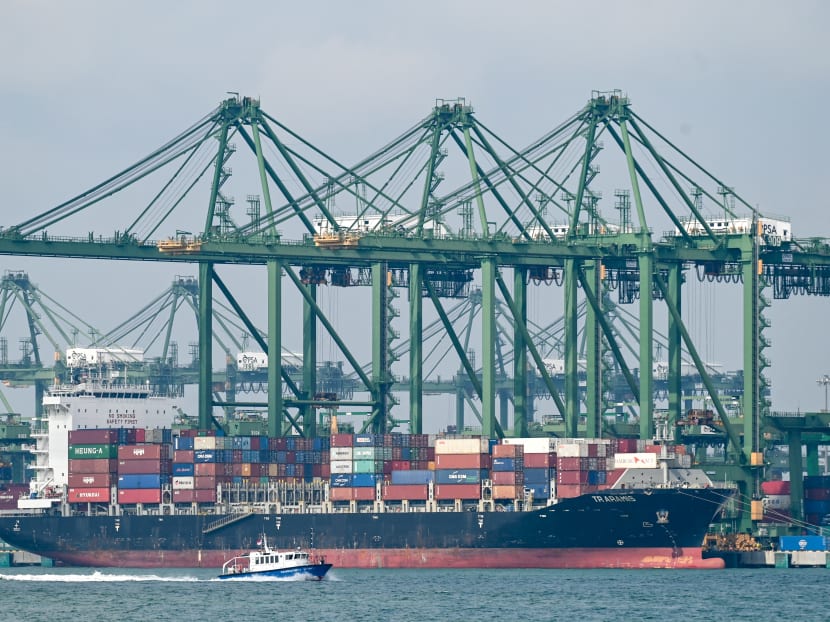Omicron poses threat to Asean’s trade recovery
The emergence of the Omicron Covid-19 variant could impact the recovery of trade in goods and services in Asean economies.

Even before Omicron’s appearance on the scene, supply chain disruptions such as longer port delays, higher shipping costs and shortages of semiconductors have threatened to derail Asean's trade recovery.
The emergence of the Omicron Covid-19 variant could impact the recovery of trade in goods and services in Asean economies.
Even before Omicron’s appearance on the scene, there were already downside risks of economic recovery.
These included supply chain disruptions — longer port delays, higher shipping costs, shortages of semiconductors — rising consumer prices and the ongoing outbreak of Covid-19 in Asean economies and their key trading partners.
The outbreak of the Omicron variant could further reduce demand for goods and services from within and outside the region in 2022.
Before the emergence of the Omicron variant, the World Trade Organization (WTO) predicted in October 2021 that global merchandise trade volume is expected to increase by 10.8 per cent in 2021 and 4.7 per cent in 2022, after falling by 5.3 per cent in 2020.
In Asia, the growth of merchandise exports is expected to increase from 0.3 per cent in 2020 to 14.4 per cent in 2021 and 2.3 per cent in 2022. However, services trade was projected to lag behind goods trade, especially in sectors related to travel and leisure.
One of the key drivers of Asian trade is the implementation of the Regional Comprehensive Economic Partnership (RCEP).
The RCEP has reached the threshold of entry into force and will take effect on Jan 1, 2022.
As of Nov 2, 10 countries have ratified the agreement. They are six Asean countries, namely Brunei, Cambodia, Laos, Singapore, Thailand and Vietnam, as well as four non-Asean signatory countries, namely Australia, China, Japan and New Zealand.
Once the RCEP is implemented on Jan 1, 2022, it should eliminate as much as 90 per cent of the tariffs on goods traded between its signatories over the next 20 years from the date of its entry into force. This means that RCEP will boost international trade of its members in the medium and long term.
However, the Omicron variant could reduce intra- and extra-Asean trade in goods and services, at least in the short term, due to greater international travel restrictions and more frequent lockdowns.
Higher travel restrictions impact trade flows by making it hard for business partners in different countries to meet in person to transact deals. In-person meetings remain essential to facilitate trade, although a large proportion of the labour force has managed to transition to working from home and firms continue to maintain business relationships.
Empirical evidence shows that a 50 per cent increase in business travel time would cause a decline in trade by about 20 per cent.
As of Dec 1, seven out of 10 Asean countries, namely Singapore, Malaysia, Indonesia, Myanmar, the Philippines, Thailand and Vietnam, have already tightened their entry and quarantine rules due to concerns over the Omicron variant.
Asean’s key trading partners such as Japan, India and South Korea have also tightened their border controls.
Although Asean countries and their trading partners have allowed business travel to resume, international travel costs, which include airfare, quarantine and testing requirements, are high. Micro and small enterprises, which engage in relatively smaller amounts of cross-border trade, may not be able to bear such costs.
In addition, the highly infectious Covid-19 variants such as Delta and Omicron increase the risk of more frequent lockdowns even if one or a handful of new cases are detected in Asean and its key trading partners. For example, China has implemented a zero-Covid strategy, which involves massive lockdowns, tight border controls, contact tracing and quarantine.
Although the country has not yet introduced tougher measures on international travel, it has already imposed extremely tight travel restrictions.
China is Asean’s biggest trading partner. More frequent lockdowns in China can reduce household consumption of imported goods, including those from Asean economies. In 2020, household consumption in China accounted for 37.7 per cent of GDP.
An analysis of International Trade Centre trade data in 2020 reveals that China was the top-ranked export destination for Indonesia, Malaysia, Myanmar and Singapore, while it was the second-ranked export destination for Laos, Thailand and Vietnam.
The remaining Asean economies, namely Brunei, Cambodia and the Philippines, listed China as their third-largest export destinations.
Asean’s heavy reliance on the Chinese market suggests that a small reduction in Chinese demand for goods from Asean can lead to a substantial reduction in Asean’s exports.
In conclusion, the Omicron variant would not only lead to greater international travel restrictions, but also increase the risk of more frequent lockdowns in Asean and its key trading partners.
The actual trade effects will depend on the ability of firms to adapt to the digital trade era, sustain business relationships without in-person meetings, and substitute foreign suppliers with domestic ones.
ABOUT THE AUTHOR:
Dr Sithanonxay Suvannaphakdy is an economist and a lead researcher at the Asean Studies Centre, Iseas–Yusof Ishak Institute. This piece first appeared on the institute’s Fulcrum website which analyses developments and trends in Southeast Asia.









